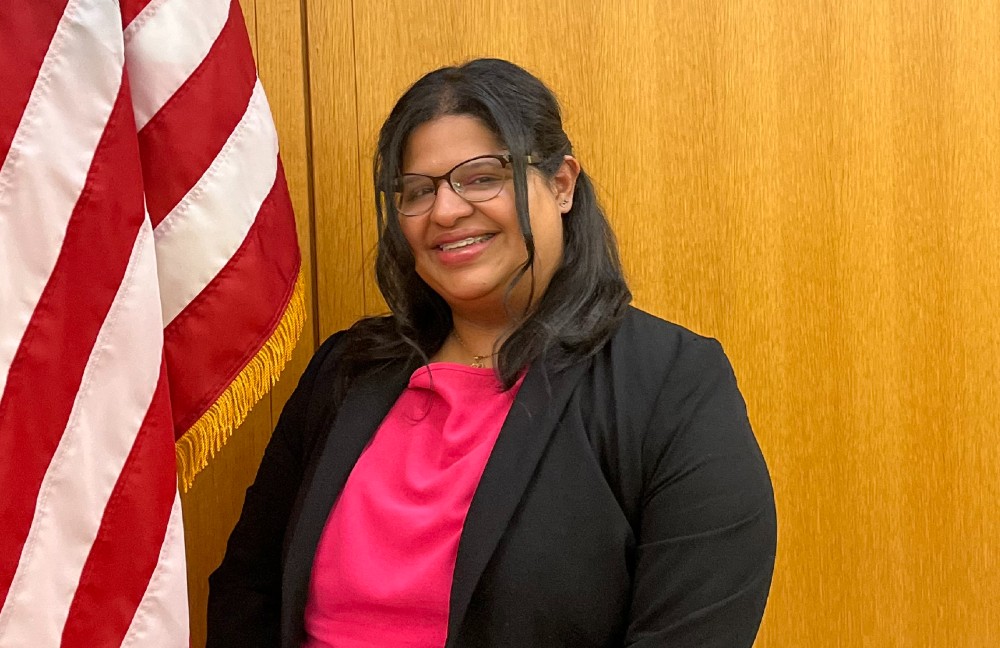
Katherine Flores ’23: NYC Court Interpreter & Future Attorney
Double Degree: B.A. in Law & Society and B.A. in Spanish (Concentration in Legal Translation and Interpretation)
Program: APPLE Corps, College Now
Mentor: Cristina Lozano Argüelles, Ph.D., Natalie Jordan and Muldy Flecher
Internships: NYS Senator Julia Salazar, NYS Unified Court System
Hometown: Honduras; Queens, NY
Current Role: Staff Interpreter, Queens Family Court
Career Aspiration: Attorney
What was life like before John Jay?
I’m a proud immigrant. I was born in Honduras and came to this country with my parents when I was nine years old, moving to the Jamaica section of Queens, New York. At the time, I didn’t speak English, so my first year in elementary school was challenging, but I soon learned the language. I quickly became the translator for my family. I think it’s one of my earliest memories of understanding how important language is, and it’s likely where my passion for translating for others began. Aside from the importance of language, I understood how important education was to achieving success in this country, so going to college was always my goal. I was the first in my family to go to and graduate from college.
Why John Jay?
I’ve always been drawn to the criminal justice field. In high school, I joined the College Now program at John Jay and experienced John Jay’s vibrant and diverse community. Seeing all the fliers announcing campus events and exciting opportunities and meeting with students and professors was so enlightening. I quickly realized John Jay was where I wanted to earn my degree.
How was APPLE Corps instrumental to your success?
Joining APPLE Corps was key to achieving my goals at John Jay—I even graduated a semester early while being a student-parent. I had incredible advisors, Natalie Jordan and Muldy Flecher, who met with me often and pushed me to do things to stay on top of my game, including taking extra classes during the summer and winter and applying to internships. Through them, I learned about interning for New York State’s Unified Court System. During the internship, I was able to help Spanish-speaking individuals navigate their way through legal proceedings. It was my first glimpse of what a rewarding career in the courts could look like.
In what ways did your mentor Cristina Lozano Argüelles, Ph.D., help put you on the path to success?
Professor Cristina Lozano Argüelles has always been one of my biggest champions. In the classroom, she taught us the vital role language and interpretation play in various industries, including the courts, and how we could use our skills to help create equity in the world. Even after I was no longer a student, she reached out with tips on how to feel more comfortable in my role, make better interpretations, and reduce anxiety. She always showed she cared. I succeed in my role today because of everything I learned from Cristina.
Why are you passionate about your current role as a legal translator and interpreter?
I had personal experiences with family members who didn’t speak English and were involved with the legal system. I understand how not speaking the language, especially during a legal proceeding, can be scary and possibly lead to a negative outcome. Doing this kind of work, I get to be a bridge for people, providing them with support, clarity, and guidance during a frightening time. Having someone who understands and can help you through the process can make a world of difference.
What does a day on the job look like for you?
Our office is always busy. Sometimes, I work on 10 to 12 cases a day. Every day is different as I’m dealing with a variety of cases, from immigration to child custody, but I try to handle each one with great care and attention to detail. I also work with really tough cases where someone was abused or a child was abandoned. Emotionally, it can be draining, but I always remind myself why I do this work: to be a voice for others. When I get to help people—especially kids and victims of domestic violence—have a voice, it’s so rewarding.
Where do you see yourself in ten years?
I would love to be an attorney working in family law, specifically with child abuse cases. Children in these horrible situations need an empathetic advocate, and I’d love to stand up for them. I’d also like to research the impact of language barriers on people impacted by the legal system. I hope that through that research and my work in the court system, I can help create change and promote fairness in the system.



